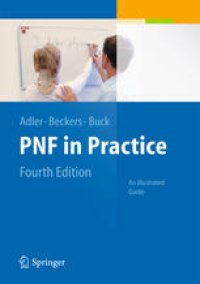
Ebook: PNF in Practice: An Illustrated Guide
- Tags: Physiotherapy, Occupational Therapy, Neurology, Rehabilitation
- Year: 2014
- Publisher: Springer-Verlag Berlin Heidelberg
- Edition: 4
- Language: English
- pdf
- The PNF approach, presented in a fully illustrated hands-on guide, including 650 photos
- Focus on practical aspects of patient evaluation and treatment
- ICF and Motor Learning and how these concepts are applied in PNF
- Provides a systematic and easily accessible guide to learning and understanding PNF as a practical tool and using it to full effect in patient treatment
New for this edition: new fully-color textbook design for more user-friendly learning experience; fully revised introductory chapter on the PNF basics, now including discussion and demonstration of ICF and Motor Learning aspects in detailed case study; throughout chapters, new additional case studies that help visualize the application of PNF techniques in promoting the patients’ everyday–life motor skills on activity and participation levels.
PNF (Proprioceptive Neuromuscular Facilitation) is a concept to therapeutic exercise which therapists all over the world have found effective for treating patients with a wide range of diagnoses. The approach presented in this richly illustrated guide is based on the concepts set out by Dr. Herman Kabat and taught by Margaret Knott. The fully revised fourth edition demonstrates how the principles of the International Classification of Functioning, Disability and Health (ICF) and aspects of motor learning and motor control (from »hands-on« to »hands-off« management) are applied in modern PNF evaluation and treatment.
A new fresh fully-coloured design and layout highlights the clearly structured way in which philosophy, basic procedures and treatment patterns of PNF are based.
New for this edition
-Fully revised introductory chapter on the PNF basics, now including discussion and demonstration of ICF and Motor Learning aspects in detailed case study.
-Throughout chapters, new additional case studies that help visualize the application of PNF applications in promoting the patients’ everyday-life motor skills on activity and participation levels.